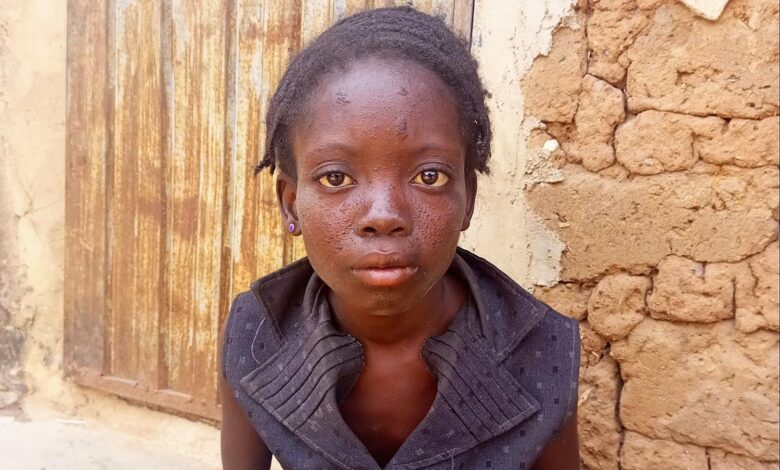After Escaping Terror, A Chronic Illness Still Haunts This Family
After displacement from their village, Audu Bakaniki and Sarah Audu struggle with their daughter’s unidentified illness.

When Grace Audu woke up with a fever one day at age three, her parents dismissed it as a simple illness that would go away after medication. But her fever shifted into something different and unidentifiable.
Now almost 15 years old, Grace spends most of her time at home when her parents are out for work. She rarely talks. There are boils covering the length and breadth of her body, which her parents haven’t gotten a solution for. The small hospital in Kalla, Kaduna, couldn’t find the cause of her illness. Worse, the family is still struggling for survival and cannot afford to tour bigger hospitals.
Before Audu Bakaniki and Sarah Audu became Internally Displaced Persons (IDP) in Kalla, they lived a simple life in Ibrako, a village under the same local government area. Like many inhabitants there, the Audus made their living as farmers – they ate from what they produced and sold the rest to meet other needs.
In April 2020, Ibrako got a surprise attack from a terror gang. Audu, Sarah and their children barely escaped with their lives. After spending time at a primary school in Rimau, the family found a small house to live in at Kalla.
“There were many restrictions in the school. The living conditions were not good and they kept telling us to move because of the students,” Audu told HumAngle.
Over the years, about 12,840 people were said to be displaced due to attacks across Kajuru, according to a Thisday report. These people were sent to the 11 camps in the Kajuru and Chikun LGAs in the state. Some of these communities get destroyed and the members never go back.
Since the Audus managed to escape the terror group that attacked their village, they have not attempted to return because they don’t know when another incident may occur.
The family of seven currently live with other extended family members. Apart from Grace’s hospital bills, there are four other children to look after. Audu lamented that work is hard to come by, but they manage to make a living working on other people’s farms.
According to the Nigerian Bureau of Statistics (NBS), about 133 million Nigerians are living in multi-dimensional poverty and about 105.98 of these people are living in rural areas causing food insecurity, and depriving people from having basic necessities like healthcare and housing.
A 2018 survey by the Nigerian Demographic and Health survey shows that only about 3 per cent of the population between the ages of 15-49 have a form of health insurance coverage. Only 20 per cent of about 30,000 primary healthcare facilities in the country are functioning and even those that are considered to be functioning are understaffed and underequipped.
For people like Audu, who have to deal with a chronically ill child in addition to their displacement, life becomes even harder. There are unmet medical bills and a lack of access to enough healthy food. There is also the absence of the kind of healthy environment a chronically ill person needs to thrive.
“At this point, we have tried everything we can, but nothing seems to be working. We are leaving everything to God,” he said.
There are many days that Grace cannot even step outside the room and, because of that, she had to stop attending school like other children her age. What is worse, sometimes she experiences severe seizures – when that happens, she usually loses control of her limbs and have intense muscle spasms.
“When her illness gets triggered, we don’t even get to sleep because of how much pain she is in. Like yesterday, we spent most of the night awake because of her situation.”
Chronic illnesses have no deadlines for healing and can affect all aspects of a person’s life, including daily activities like walking, getting dressed or even using the toilet. These illnesses also affect the lives of the people around the chronically ill person.
“We really need help. There isn’t much that the hospital can do for her. They give her a few drugs to help her cope with the pain, but it always comes back,” Audu concludes with pain in his voice.
Support Our Journalism
There are millions of ordinary people affected by conflict in Africa whose stories are missing in the mainstream media. HumAngle is determined to tell those challenging and under-reported stories, hoping that the people impacted by these conflicts will find the safety and security they deserve.
To ensure that we continue to provide public service coverage, we have a small favour to ask you. We want you to be part of our journalistic endeavour by contributing a token to us.
Your donation will further promote a robust, free, and independent media.
Donate HereStay Closer To The Stories That Matter




